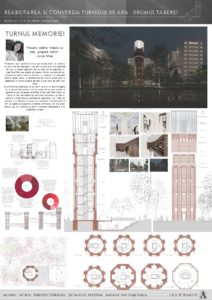Scholar Architect 2022 is a research project at the University of Architecture and Urbanism “Ion Mincu” in Bucharest, Ileana’s alma mater, that opens up the dialogue and cooperation with diverse academic and professional environments, on topics related to research and pedagogy of the design process. The exchange was launched with a teaching methods webinar and a tandem online exhibition of student projects, which propose urban interventions embedded in the social space similar to the Research Methods course at D‑ARCH. Follow the online exhibition by clicking on the project image.
L200 is a collective initiative around a shared urban space in Zurich, which a group of associations present in the Kreis 5 neighborhood, including NetHood, aim to transform it into a hybrid urban living lab managed as a commons, responding to several local needs such as a) to meet fellow neighbors in a common space, b) to promote local shops, ateliers and initiatives, c) to network people, activities and places in both analogue and digital forms, and d) to facilitate collective learning processes on various topics. From our perspective at NetHood L200 is a spin-off of the MAZI and netCommons projects, recognizing the need of a permanent public, and centrally located space that can host a wide variety of participatory processes around technology, housing, collective learning, and more becoming in essence a reference point and real-life testbed for NetHood’s current and future projects.
PARLA (PARticipatory LAboratory) aims to network localities and to bring in touch people in proximity by organizing events in neighborhood places that catalyze a participatory process toward conviviality. Geographic locations today are part of the hybrid (physical and digital) space, and thus local networking means connecting places as well as people through both means. The purpose of the PARLA project is twofold. In the long term such deliberative participatory practices enable the formation of local networks, and initiate also social learning processes around neighborhood-relevant topics. At the same time, the project has a transdisciplinary research dimension that pertains to a phenomenological approach to hybrid (physical and digital) local networks, considering society and technology (artifact and attitude that makes it meaningful) as being each other’s condition of possibility to be. In community networks, this phenomenological take reveals the constitutive conditions that make local technologies relevant and refers to a know-how that is the result of embodied, improvisational, relationship-attuning practice.
Cultures 4 Resilience (C4R) aims to strengthen the action of a wide range of actors (citizens, professionals of the creative and cultural sector, public administrations, local associations) working on environmental and urban resilience issues. It proposes a holistic approach to resilience using immersive cultural practices and collaborative tools as bridges to increase resilience, diversify modes of involvement in “territorial empowerment” and promote capacity building, creativity and education in peripheral territories.
